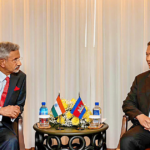“Jaishankar Highlights Global Double Standards and the Need for Change – Insights from the Event ‘South Rising: Partnerships, Institutions, and Ideas.’ Explore the challenges of international relations and the call for equitable reforms in this article.”

Jaishankar Highlights Global Double Standards: Need for Change in Global Dynamics
External Affairs Minister S Jaishankar has addressed the issue of double standards prevailing in international affairs, particularly in the Global North, during a Ministerial Session titled ‘South Rising: Partnerships, Institutions, and Ideas.’ The event, hosted by the Observer Research Foundation (ORF) in collaboration with the Permanent Mission of India to the United Nations, United Nations India, and the Reliance Foundation, provided a platform for Jaishankar to share his perspective on global dynamics.
Jaishankar began by asserting that the world continues to witness double standards, and some influential countries are reluctant to embrace change. He specifically pointed out that nations with historical influence have harnessed their capabilities for their own benefit.
Speaking at the event in New York, Jaishankar noted that beyond the need for political will, there is a growing political pressure for change. While the sentiment for change is on the rise globally, there is also resistance, particularly from countries holding positions of power.
He highlighted that nations occupying positions of influence, such as those in the UN Security Council, often resist the pressure to adapt to new global realities. Jaishankar underlined the economic dominance of certain countries that leverage their production capabilities, while others with institutional or historical influence have weaponized their capabilities.
Despite these countries’ public proclamations, they often fail to uphold the standards they advocate for, as exemplified by the global response to the COVID-19 pandemic.
Jaishankar emphasised that a transition is underway, with the Global South playing a pivotal role in pressuring the international system to evolve. He also highlighted the need for cultural rebalancing, which involves acknowledging and respecting the world’s diversity in heritage, traditions, music, literature, and ways of life.
Drawing from the recent G20 Summit in Delhi, Jaishankar cited the example of millets, a traditional grain, and its significance in the Global South’s dietary habits. He pointed out that market forces and the pursuit of freedom often disregard cultural heritage, resulting in the need for change.
The event also featured discussions by India’s Permanent Representative to the United Nations, Ambassador Ruchira Kamboj, Reliance Foundation CEO Jagannatha Kumar, UN Resident Coordinator in India Shombi Sharp, and ORF President Samir Saran. Additionally, the panel included the Minister of Foreign Affairs of Portugal, Joao Gomes Cravinho, and the Minister of Foreign Affairs and Foreign Trade of Jamaica, Kamina Johnson Smith.
Jaishankar concluded by highlighting India’s role as a bridge between the Global South and the international community. He expressed hope that, with a few months left in India’s G20 Presidency, efforts to reform international financial institutions would gain momentum, fostering a more inclusive and equitable global order.
The External Affairs Minister’s remarks shed light on the complex dynamics of international relations and the ongoing struggle to address double standards while fostering global cooperation and understanding.
Note: This article is a summary of External Affairs Minister S Jaishankar’s statements at the event ‘South Rising: Partnerships, Institutions, and Ideas’ and provides context to his remarks on global double standards and the need for change in the international system.
Jaishankar’s comments resonate in a world where the balance of power, both politically and economically, is constantly shifting. The acknowledgment of double standards at the global level highlights the challenges in achieving a more equitable and just international order.
In his address, Jaishankar stressed that political pressure for change is becoming increasingly significant. This underscores the importance of collective action and the role of countries, especially those in the Global South, in pushing for meaningful reforms.
The External Affairs Minister’s reference to the UN Security Council highlights a long-standing issue in international governance: the need for reform and a more representative global body. The UN Security Council, with its five permanent members (the P5), has often been criticised for its inability to adapt to contemporary challenges and for reflecting the power dynamics of a bygone era. Jaishankar’s remarks can be seen as a call for a more inclusive and responsive global governance structure.
Furthermore, Jaishankar’s mention of the COVID-19 pandemic as an example of global double standards is a poignant reminder of the disparities in access to vaccines, treatments, and resources. It underscores the need for global solidarity and cooperation in addressing shared challenges.
The idea of cultural rebalancing, as articulated by Jaishankar, emphasises the importance of respecting and preserving cultural diversity. In a globalised world where cultural homogenization is a concern, recognising and celebrating different cultures is essential for promoting understanding and harmony among nations.
Jaishankar’s remarks on millets and dietary habits in the Global South highlight the consequences of market-driven globalisation, where traditional practices and knowledge can be marginalized. This points to the importance of striking a balance between economic development and the preservation of cultural heritage.
As India holds the G20 Presidency, Jaishankar’s hope for progress on the reform of international financial institutions is significant. These institutions play a crucial role in shaping the global economic landscape, and reforms can contribute to a fairer distribution of resources and decision-making power.
In conclusion, External Affairs Minister S. Jaishankar’s comments at the ‘South Rising: Partnerships, Institutions, and Ideas’ event reflect the complexities and challenges of global politics. They underscore the urgency of addressing double standards, reforming international institutions, and fostering a more inclusive and culturally respectful world order. As the Global South gains prominence on the world stage, its role in shaping the future of international relations becomes increasingly crucial.









